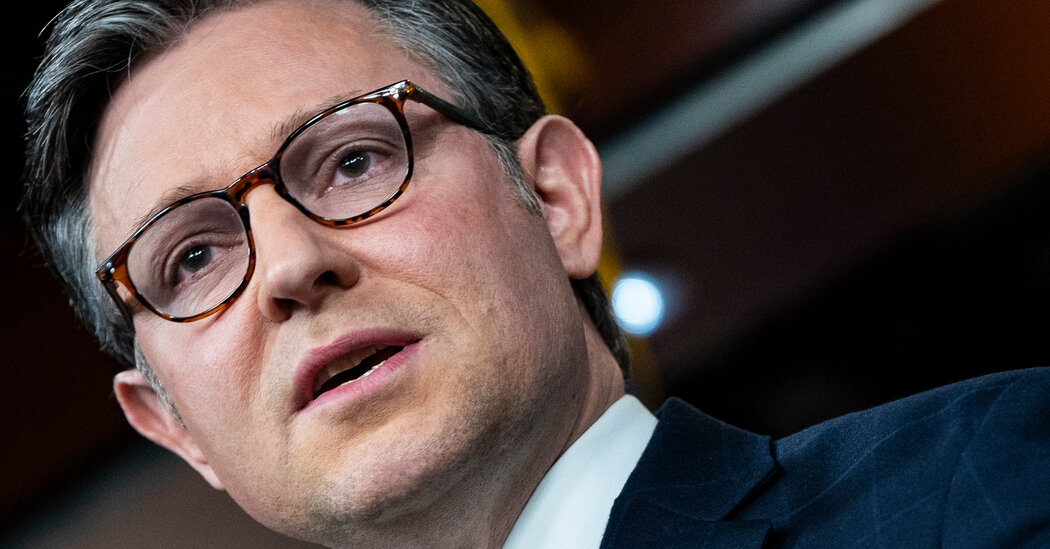In the first three months of this year, the independent watchdog that investigates members of the House of Representatives received more than 4,000 messages from the public, some accusing lawmakers of serious misconduct.
Not a single one was examined, because Speaker Mike Johnson had yet to constitute the office charged with doing so.
Under House rules, the Office of Congressional Conduct cannot start inquiries, hire staff members or take formal action on public complaints without a board named by the speaker. Mr. Johnson did not do so until this month, the longest delay since the office was created in 2008. And even now, he has yet to install a full complement of board members, hobbling its ability to act.
Mr. Johnson has not explained why he waited until May 13 to empower investigators to begin their work, and his office has not responded to questions about it. But the delay has mired the lone in-house independent overseer of congressional conduct in quicksand at a time when the Trump administration has been conducting a full-scale assault on independent watchdogs within the federal government.
Just days after Mr. Trump was inaugurated, the White House fired 17 inspectors general, the independent officials who investigate abuse and misconduct inside federal agencies. The F.B.I. and the Justice Department have both dismantled or downsized groups that investigate public corruption and fraud. And Mr. Trump dismissed the leaders of two independent agencies charged with good-government oversight — the Office of Government Ethics and the Office of Special Counsel — and placed them under the control of cabinet members in unrelated posts.
“The Trump administration has ushered in a whole new era in which ethics does not matter whatsoever,” said Craig Holman, a government ethics and campaign finance expert with the watchdog group Public Citizen.
Mr. Johnson’s recent move has effectively made the Office of Congressional Conduct one of the few government-funded watchdogs to be given the green light — albeit belatedly and in a weakened capacity — to operate at a time when others are under siege.
With their party in full control of the federal government, Republicans in Congress have shown little interest in flexing their investigatory muscles on the Trump administration. Instead they have preemptively ceded their oversight and spending powers to a president eager to blow past any check or balance.
Good-government groups and a number of Democrats had been urging Mr. Johnson for months to appoint a board for the Office of Congressional Conduct to show that lawmakers still had some appetite for oversight of themselves.
Still, Mr. Johnson has left the office operating at only partial strength. He named just four members to a board meant to have six, meaning that there must be unanimous agreement for the office to formally conclude its reports. And the backlog of complaints that accumulated while the speaker left the board vacant may delay its small staff from carrying out timely investigations.
Mr. Johnson’s tarrying also underscored the reliance of the watchdog agency, originally created as the Office of Congressional Ethics, on the chamber that it is supposed to be policing. The office cannot operate without the speaker’s say-so. And it has no punitive power; it can only refer issues to House members for further action.
Representative Chris Pappas of New Hampshire, who led a group of Democrats in a letter this month urging Mr. Johnson to appoint a board, said that he welcomed the speaker’s move to finally do so. But he said Mr. Johnson’s stalling proved that the office needed further independence.
“We shouldn’t be doing this on an annual, biennial basis,” Mr. Pappas said in an interview. “We really should codify this permanently. We’ve sought to do that through legislation, and we’re going to continue to push that idea.”
The watchdog office was originally set up in 2008 in the aftermath of corruption and bribery scandals that ultimately sent three members of Congress to jail. At the time, the House faced criticism that members were too slow or reluctant to investigate their peers, offering little deterrent against misconduct. That perception has lingered; the secretive House Ethics Committee rarely takes aggressive action against one of its own.
This year, that committee, which is evenly split between Republicans and Democrats, was not officially constituted until March. And it began the year facing heightened scrutiny after it released a bombshell report in December that found that former Representative Matt Gaetz, the Florida Republican who was Mr. Trump’s first pick for attorney general, had regularly paid women for sex, had sex with an underage girl and used illegal drugs.
Mr. Johnson initially sought to block the release of the report, arguing that Mr. Gaetz’s resignation put him beyond the committee’s jurisdiction. The panel ultimately made it public just before Christmas, weeks after Mr. Gaetz had withdrawn from consideration to lead the Justice Department.
Kedric Payne, a vice president at the Campaign Legal Center who previously was a deputy chief counsel for the Office of Congressional Ethics, said the case further exposed the need for an independent body to investigate members of Congress.
Though the Ethics Committee began investigating Mr. Gaetz in 2021, it was never under any obligation to conclude or publish its findings. The Office of Congressional Conduct is a nonpartisan body that is required to complete its inquiries in no more than 89 days.
And Mr. Payne said that the dispute over the Gaetz investigation underscored how lawmakers on the Ethics Committee could be subject to political pressure.
“Because the Committee on Ethics is bipartisan and made up of sitting members, they end up being paralyzed by political pressure,” Mr. Payne said.
Under rules that have been in place since the watchdog office was established, the Office of Congressional Conduct cannot properly operate without at least four members of a six-person board, half of which is chosen by the speaker and half by the minority leader. Sitting lawmakers, lobbyists and federal employees are barred from serving on the board, which is often made up of former officials or members of Congress who serve in a part-time capacity. The board members named this month include two former House clerks and two retired lawmakers, one Republican and one Democrat.
Representative Hakeem Jeffries, the Democratic leader, provided the names of his nominees to Mr. Johnson months ago, according to two people familiar with the matter who said they were not authorized to discuss it publicly.
Under the office’s rules, staff members can start an initial investigation only when one board member appointed by the speaker and another by the minority leader agree. A deeper review requires a meeting of at least four board members.
The office, which has no equivalent counterpart in the Senate, can investigate accusations of misconduct made by people outside Congress or detailed in news reports. It has no subpoena power, but its staff conducts interviews and collects documents, then issues detailed reports that describe any possible violation of ethics rules or laws.
Four members of the board must agree whether to recommend that the Ethics Committee further investigate a case or dismiss it. If the office suggests a review, the ethics panel is generally required to publicly release the office’s report, even if lawmakers decide not to take any action themselves.
House members from both parties have criticized the independent office over the years, particularly when they are in its sights. In early years, representatives often argued that the board duplicated the Ethics Committee’s work and was overzealous.
The office has also more recently faced accusations of partisan bias, though board members testified at a hearing in 2023 that its cases had been almost equally divided between Democrats and Republicans.
And though both parties have grumbled publicly and privately about the office, Republicans have more recently sought to diminish it.
In early 2017, House Republicans moved to effectively kill the office by putting it under the control of the Ethics Committee and taking away its ability to accept anonymous complaints. Mr. Trump, then weeks away from the start of his first term, publicly questioned the move, and Republicans reversed course.
More recently, Republicans in 2023 pushed rules through the House that weakened the office by allowing the Ethics Committee to begin accepting complaints from the public, bypassing the independent office. And they created a new rule requiring the office to hire staff members within the first 30 days of Congress, a deadline that ethics watchdogs predicted might make hiring difficult.
This year, the rules package that Republicans approved required the office to hire staff members and set salaries within the first 30 days after Mr. Johnson named its board.
Michael Gold covers Congress for The Times, with a focus on immigration policy and congressional oversight.
The post Complaints Languished as Johnson’s Delays Hobbled House Watchdog appeared first on New York Times.




